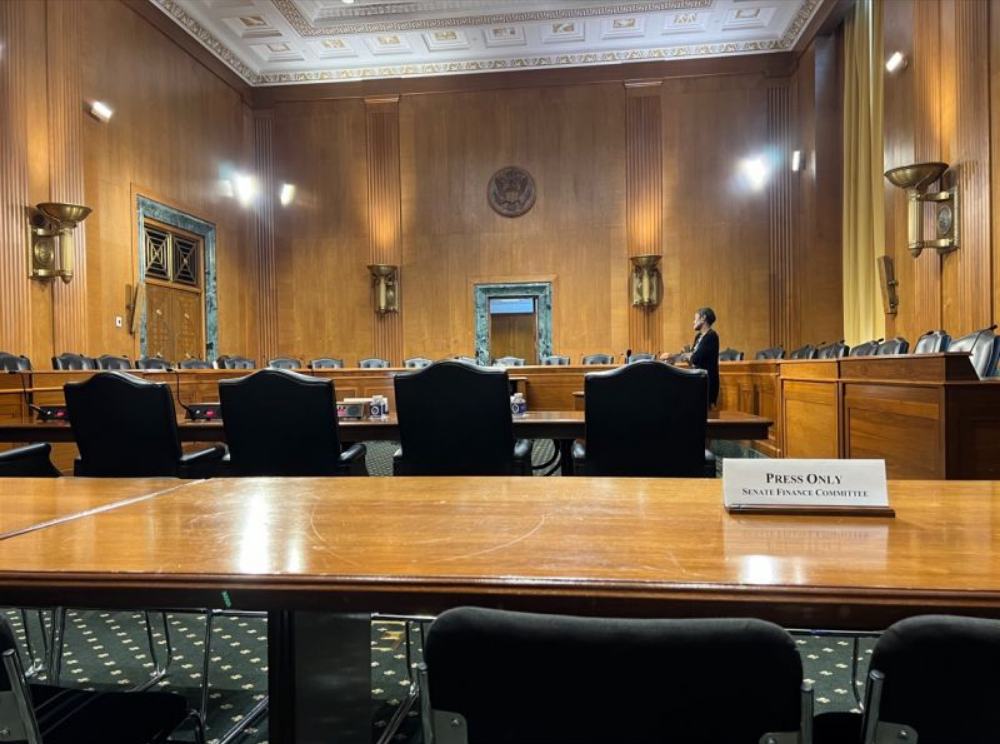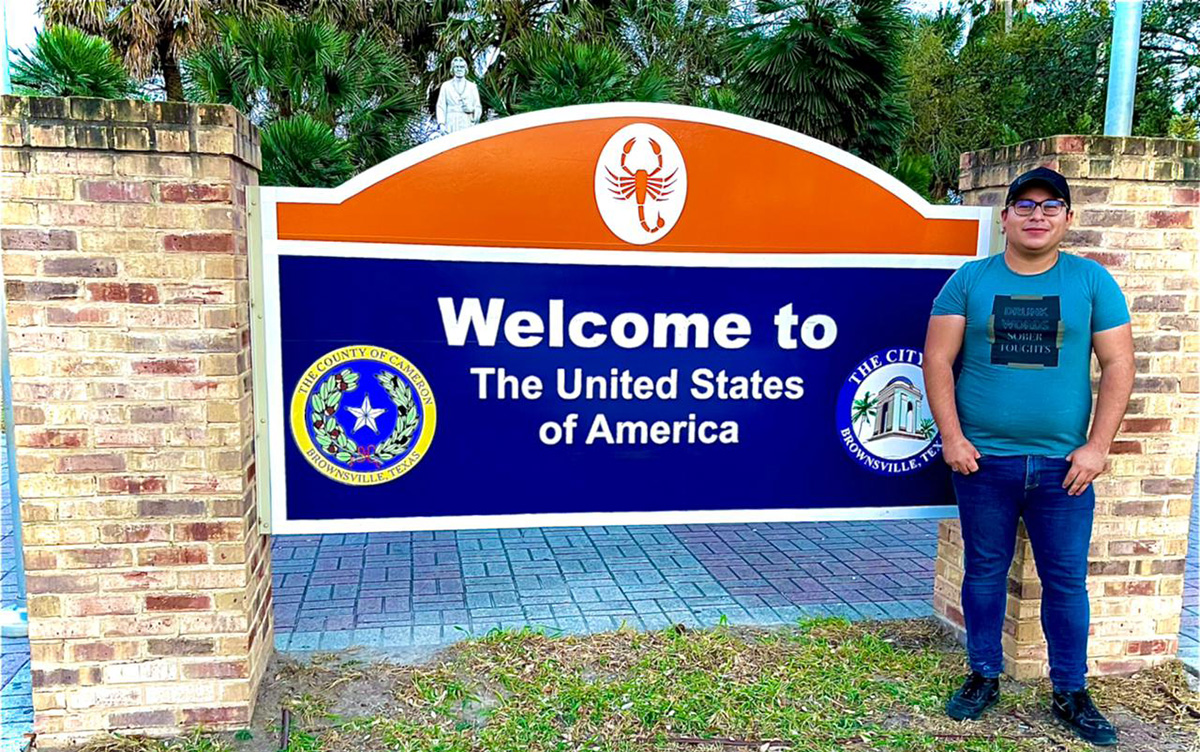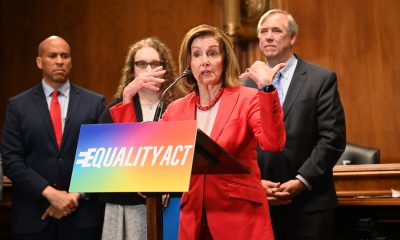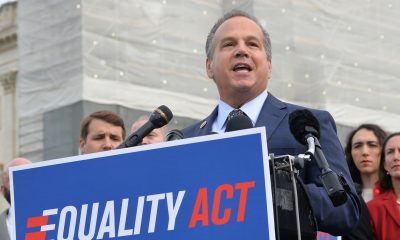National
Two gay candidates shine in fundraising
Pougnet, Cicilline post strong second-quarter results

Congressional candidate David Cicilline, the mayor of Providence, R.I., has raised $1.16 million over the course of his campaign. (Photo courtesy of Cicilline)
Two gay politicians posted strong second-quarter fundraising numbers that could propel them to seats in Congress.
Campaign finance reports made public earlier this month show Steve Pougnet, the mayor of Palm Springs, Calif., and David Cicilline, the mayor of Providence, R.I., boasting particularly strong numbers.
And Pougnet had the added accomplishment of keeping his fundraising numbers on par with his incumbent Republican opponent, Rep. Mary Bono Mack (R-Calif.). Both candidates raised about $400,000 for the April to June period.
The second-quarter numbers mean Pougnet has raised $1,267,910 so far in his campaign, leaving him with $878,283 in cash on hand, while Bono Mack raised $1,731,752, leaving her with $1,241,919 in cash on hand.
In a statement, Pougnet said he’s “incredibly humbled” by the support he’s received in his bid to represent California’s 45th congressional district.
“In these very difficult times, our congresswoman has been absent and it’s clear people are hungry for change,” Pougnet added.
But Ryan Mahoney, campaign manager for Bono Mack, touted the Republican candidate’s fundraising ability and noted that Bono Mack is “humbled” by the support she’s received.
“She is proud to represent the people of California’s 45th congressional district and will continue to fight on their behalf to end reckless spending and debt in Washington and create more jobs and better business opportunities in California,” Mahoney said.
Pougnet’s ability to match Bono Mack during the second quarter is unusual because challengers often do not match their incumbent opponents in fundraising. The fundraising numbers are also significant because the race in the 45th district is widely seen as among the most competitive congressional contests in the country.
The Democratic Congressional Campaign Committee put Pougnet on its “Red to Blue” program, and Bono Mack has been a lawmaker the National Republican Congressional Committee has worked to protect.
Notable donations to Pougnet from LGBT groups include $2,400 from the Gay & Lesbian Victory Fund and $6,900 from the Human Rights Campaign. Both organizations have endorsed the candidate. Donations also have come from Bruce Bastian, a Utah-based gay billionaire philanthropist, who donated $2,400; Hilary Rosen, a D.C. lesbian PR executive, who donated $1,000; and Lane Hudson, a D.C. gay activist, who contributed $300.
But Bono Mack is not without LGBT donors. In April, the Log Cabin Republicans gave $500 to her campaign.
Bono Mack had been considered a pro-LGBT Republican because of her votes in favor of the hate crimes bill and a version of the Employment Non-Discrimination Act, as well as votes against the Federal Marriage Amendment. Her record was tarnished in May when she voted against an amendment that would lead to repeal of “Don’t Ask, Don’t Tell.”
R. Clarke Cooper, Log Cabin’s national director, noted his organization made the $500 contribution prior to Bono Mack’s vote against “Don’t Ask, Don’t Tell” repeal.
He said although Bono Mack voted against the repeal amendment, she ultimately voted in favor of the fiscal year 2011 defense authorization bill as a whole. Consequently, Cooper said Log Cabin’s endorsement of the Republican lawmaker stands.
“[Log Cabin] will continue to work with Representative Bono Mack,” Cooper said. “Using the carrot approach, additional [Log Cabin] PAC funds could be made available contingent upon her future work and performance in the House.”
Cicilline, who’s running to succeed Rep. Patrick Kennedy (D-R.I.) to represent Rhode Island’s 1st congressional district, meanwhile raised $436,000 in the second quarter. He’s raised $1.16 million over the course of his campaign and ended the quarter with $901,000 in cash on hand.
In a statement provided by his campaign, Cicilline said he’s pleased with his fundraising and the LGBT support he received in the second quarter.
“I am extremely grateful to the members of our community who are supporting my campaign for Congress,” he said. “They are helping to ensure that we have the resources necessary to get our message out for the Sept. 14 primary.”
Bill Lynch, the former head of the Rhode Island Democratic Party who’s running against Cicilline in the primary, raised $55,832 in the second quarter. In the same period, he spent $126,000, leaving him with $139,000 in cash on hand.
The winner of the Democratic primary will likely face Republican John Loughlin, an Iraq war veteran and Rhode Island Assembly member. He raised $104,786 in the second quarter while spending $192,000. Loughlin has $101,000 in cash on hand.
Cicilline is running in a safely Democratic district and the Democratic nominee who wins the primary is widely expected to succeed Kennedy in the U.S. House.
The Providence mayor has been the beneficiary of LGBT support over the course of the campaign, particularly during the second quarter. The Gay & Lesbian Victory Fund, which has endorsed Cicilline, contributed $2,400 to his campaign in the second quarter.
Michael Cole, an HRC spokesperson, said his organization donated $721 to Cicilline in the second quarter, which was mostly in-kind contributions raised through HRC’s website.
Noting that HRC previously donated $6,025 to Cicilline, Cole said HRC plans to max out that contribution to $10,000 by year’s end.
Among the notable contributors to Cicilline’s campaign in the second quarter were Bastian, who donated $4,800; Rosen, who donated $500; Joe Solmonese, HRC’s president, who personally donated $500; and Winnie Stachelberg, senior vice president for external affairs at the Center for American Progress, who donated $1,000.
Other gay congressional candidates seeking office didn’t fare as well as Pougnet or Cicilline during the second quarter.
Ed Potosnak, a gay Democratic former staffer for Rep. Mike Honda (D-Calif.) and public school teacher running in New Jersey, raised $47,000 in the second quarter while spending $26,000.
His finances leave him with $72,000 in cash on hand. Potosnak has raised $148,000 over the course of his campaign. Potosnak’s GOP opponent in his race to represent New Jersey’s 7th congressional district, one-term incumbent Rep. Leonard Lance (R-N.J.), raised $108,000. However, he spent nearly $250,000 in the same period, leaving him with $359,000 in cash on hand.
In what could be an uphill battle for a U.S. House seat, Potosnak is running in a traditionally Republican district. He hasn’t been endorsed by HRC or the Victory Fund.
Despite the funding disparity, Potosnak said he’s happy with the amount he raised in the second quarter because it came from individuals donors and not special interest money.
“Compared to the opponent, the guy that I’m running against, Congressman Lance, I received more contribution from individuals in the last filing — about $5,000 more,” Potosnak said. “I didn’t get the special interest money from the big banks and Wall Street that are fueling his campaign.”
A similar situation with campaign finances is playing out in Florida’s 17th congressional district, where nine candidates, including North Miami City Council member Scott Galvin, are vying for the Democratic nomination in a primary set for Aug. 24.
After raising $57,000 in the second quarter while spending $97,000, Galvin had about $15,000 in cash on hand. He’s raised about $112,000 over the course of his campaign, according to FEC records.
Galvin said he’s feeling good about his finances for the second quarter and was preparing to submit an amended report showing that he has raised $130,000 over the course of his campaign.
“We found several pages of donations that didn’t get included by accident, so for what it’s worth, the to-date total, I guess, would show $130,000,” Galvin said.
The Gay & Lesbian Victory Fund, which has endorsed Galvin, contributed $2,400 to his campaign during the second quarter.
The candidate in the Democratic primary with the greatest war chest is Rudolph Moise, a physician and president of the Comprehensive Health Center in North Miami. He raised $938,162 for his campaign, although $800,000 was a personal loan to his campaign from himself. He spent $280,000 in the second quarter, leaving him with $909,000 in cash on hand.
Galvin said the disparity in finances didn’t bother him and he would remain focused on a “grassroots concentrated effort.”
“We’re doing it through all the old-fashioned, knocking-on-door, mail-to-the-home, traditional way of campaigning,” he said.
The 17th congressional district in Florida is also considered a safely Democratic seat. No Republican candidate has filed for candidacy, so the winner of the Democratic primary would be the presumptive winner of the seat.
Arizona
Ariz. governor vetoes anti-transgender, Ten Commandments bill
Katie Hobbs has pledged to reject anti-LGBTQ bills that reach her desk

BY CAITLIN SIEVERS | A slew of Republican bills, including those that would have allowed discrimination against transgender people and would have given public school teachers a green light to post the Ten Commandments in their classrooms, were vetoed by Gov. Katie Hobbs on Tuesday.
Hobbs, who has made it clear that she’ll use her veto power on any bills that don’t have bipartisan support — and especially ones that discriminate against the LGBTQ community — vetoed 13 bills, bringing her count for this year to 42.
Republicans responded with obvious outrage to Hobbs’s veto of their “Arizona Women’s Bill of Rights,” which would have eliminated any mention of gender in state law, replacing it with a strict and inflexible definition of biological sex. The bill would have called for the separation of sports teams, locker rooms, bathrooms, and even domestic violence shelters and sexual assault crisis centers by biological sex, not gender identity, green-lighting discrimination against trans Arizonans.
“As I have said time and again, I will not sign legislation that attacks Arizonans,” Hobbs wrote in a brief letter explaining why she vetoed Senate Bill 1628.
The Arizona Senate Republicans’ response to the veto was filled with discriminatory language about trans people and accused them of merely pretending to be a gender different than they were assigned at birth.
“With the radical Left attempting to force upon society the notion that science doesn’t matter, and biological males can be considered females if they ‘feel’ like they are, Katie Hobbs and Democrats at the Arizona State Legislature are showing their irresponsible disregard for the safety and well-being of women and girls in our state by killing the Arizona Women’s Bill of Rights,” Senate Republicans wrote in a statement.
The Senate Republicans went on to accuse the Democrats who voted against the bill of endangering women.
“Instead of helping these confused boys and men, Democrats are only fueling the dysfunction by pretending biological sex doesn’t matter,” Senate President Warren Petersen said in the statement. “Our daughters, granddaughters, nieces, and neighbors are growing up in a dangerous time where they are living with an increased risk of being victimized in public bathrooms, showers, and locker rooms because Democrats are now welcoming biological males into what used to be traditionally safe, single-sex spaces.”
But trans advocates say, and at least one study has found, that there’s no evidence allowing trans people to use the bathroom that aligns with their identity makes those spaces less safe for everyone else who uses them.
In the statement, the bill’s sponsor, Sen. Sine Kerr (R-Buckeye), claimed that the bill would have stopped trans girls from competing in girls sports, something she said gives them an unfair advantage. But Republicans already passed a law to do just that in 2022, when Republican Gov. Doug Ducey was still in office, though that law is not currently being enforced amidst a court challenge filed by two trans athletes.
Republicans also clapped back at Hobbs’ veto of Senate Bill 1151, which would have allowed teachers or administrators to teach or post the Ten Commandments in public school classrooms, a measure that some Republicans even questioned as possibly unconstitutional.
In a statement, the bill’s sponsor, Sen. Anthony Kern (R-Glendale), accused Hobbs of “abandoning God” with her veto.
“As society increasingly strays away from God and the moral principles our nation was founded upon, Katie Hobbs is contributing to the cultural degradation within Arizona by vetoing legislation today that would have allowed public schools to include the Ten Commandments in classrooms,” Kern said in the statement.
In her veto letter, Hobbs said she questioned the constitutionality of the bill, and also called it unnecessary. During discussion of the bill in March, several critics pointed out that posting the Ten Commandments in public school classrooms, tenets of Judeo-Christian religions, might make children whose families practice other religions feel uncomfortable.
“Sadly, Katie Hobbs’ veto is a prime example of Democrats’ efforts to push state-sponsored atheism while robbing Arizona’s children of the opportunity to flourish with a healthy moral compass,” Kern said.
Another Republican proposal on Hobbs’s veto list was Senate Bill 1097, which would have made school board candidates declare a party affiliation. School board races in Arizona are currently nonpartisan.
“This bill will further the politicization and polarization of Arizona’s school district governing boards whose focus should remain on making the best decisions for students,” Hobbs wrote in her veto letter. “Partisan politics do not belong in Arizona’s schools.”
******************************************************************************************

Caitlin joined the Arizona Mirror in 2022 with almost 10 years of experience as a reporter and editor, holding local government leaders accountable from newsrooms across the West and Midwest. She’s won statewide awards in Nebraska, Indiana and Wisconsin for reporting, photography and commentary.
******************************************************************************************
The preceding piece was previously published by the Arizona Mirror and is republished with permission.
Amplifying the voices of Arizonans whose stories are unheard; shining a light on the relationships between people, power and policy; and holding public officials to account.
Arizona Mirror is part of States Newsroom, the nation’s largest state-focused nonprofit news organization.
National
Senate committee: Republican attorneys general abused power demanding trans medical records
AGs used ‘abusive legal demands’

In a 10-page report released on Tuesday by staff for the Democratic majority of the U.S. Senate Finance Committee, the Republican attorneys general of Tennessee, Missouri, Indiana, and Texas are accused of using “abusive legal demands” to collect the medical records of transgender patients in furtherance of the attorneys general’ “ideological and political goals.”
According to the document, which is titled “How State Attorneys General Target
Transgender Youth and Adults by Weaponizing the Medicaid Program and their Health Oversight Authority,” the attorneys general used specious or misleading legal pretexts to justify their issuance of civil investigative demands to healthcare providers.
For example, the office of Tennessee Attorney General Jonathan Skrmetti framed the request as part of a probe into the potential misuse of Medicaid funds, while the offices of Indiana Attorney General Todd Rokita and Missouri Attorney General Andrew Bailey cited suspected violations of consumer protection laws. The office of Texas Attorney General Ken Paxton, which demanded records from “at least two hospitals located in Texas as well as at least two medical providers” in Washington and Georgia, did not disclose why the requests were issued.
The report found that information requested by the attorneys general’s offices included “invasive items such as unredacted physical and mental health records, photographs of children’s bodies, correspondence to hospitals’ general email addresses for LGBTQIA+ patients, and lists of people referred for transgender health care.”
In response, and in what the committee called “a grave violation of patient privacy and trust,” some providers turned over “near-complete, patient-identifiable” information while others used legal processes available to them such as privacy protections in the Health Insurance Portability and Accountability Act to share fewer details with the attorneys general’s offices.
The report noted that Vanderbilt University Medical Center in Nashville had “failed to object in any material manner to the Tennessee attorney general’s sweeping request and then caused undue terror to young patients and their families by supplying the Tennessee attorney general with some of the records requested and then, again, by erroneously notifying some patients of medical record disclosures that had not occurred.”
News concerning Vanderbilt’s receipt of and compliance with the demands from Skrmetti’s office was made public in June, sparking widespread concern and panic among many of the center’s trans patients and their families. Some, according to the report, experienced suicidal ideation and emotional distress including depression and anxiety.
A plaintiffs’ lawsuit was filed in July over VUMC’s failure to redact personally identifying information from the medical records. The following month, the center disclosed plans to comply with an investigation by the U.S. Department of Health and Human Services Office of Civil Rights.
In a statement to NBC News, Michael Regier, the medical center’s general counsel and secretary, said the hospital disputes the findings published in the committee’s report and had submitted “a detailed letter outlining our concerns about its proposed findings before it was released.”
“We made every effort to both protect our patients and follow the law,” Regier said, adding that “At no point did we violate privacy laws, and we strongly disagree with any suggestion that we did.”
However, the committee’s report notes that by contrast, providers in other states like the Washington University School of Medicine in St. Louis refused to turn over patient records, citing privacy concerns and HIPPA regulations. And after staff for U.S. Sen. Ron Wyden (D-Ore.), the committee chair, had requested and reviewed copies of correspondence between VUMC and the Tennessee attorney general’s office, they concluded that the documentation “sheds light, for the first time, on the full extent of VUMC’s acute and repeated failures to protect its patients.”
For example, the report explains that after Skrmetti’s office issued the initial request to VUMC, it followed up with two additional civil investigative demands for “confidential information across 18 categories without any bounds on the number of patients or people implicated” ranging from “employment contracts for physicians to volunteer agreements for the
VUMC Trans Buddy Program to communications to and from a general email address.”
In response, the hospital shared “65,000 pages of documents, including the medical records of 82 transgender patients.” The information that was provided pursuant to receipt of Skrmetti’s office’s third civil investigative demand is unknown.
Related:

The U.S. has granted asylum to a Guatemalan LGBTQ activist who fled his country in 2019.
Estuardo Cifuentes and his partner ran a digital marketing and advertising business in Guatemala City.
He previously told the Washington Blade that gang members extorted from them. Cifuentes said they closed their business after they attacked them.
Cifuentes told the Blade that Guatemalan police officers attacked him in front of their home when he tried to kiss his partner. Cifuentes said the officers tried to kidnap him and one of them shot at him. He told the Blade that authorities placed him under surveillance after the incident and private cars drove past his home.
Cifuentes arrived in Matamoros, a Mexican border city that is across the Rio Grande from Brownsville, Texas, in June 2019. He asked for asylum in the U.S. based on the persecution he suffered in Guatemala because of his sexual orientation.
The Trump administration forced Cifuentes to pursue his asylum case from Mexico under its Migrant Protection Protocols program that became known as the “remain in Mexico” policy.
Cifuentes while in Matamoros ran Rainbow Bridge Asylum Seekers, a program for LGBTQ asylum seekers and migrants that the Resource Center Matamoros, a group that provides assistance to asylum seekers and migrants in the Mexican border city, helped create.
The Biden-Harris administration in January 2021 suspended enrollment in MPP. Cifuentes entered the U.S. on March 3, 2021.
“We are profoundly relieved and grateful that my husband and I have been officially recognized as asylees in the United States,” Cifuentes told the Blade on Monday in an email. “This result marks the end of a long and painful fight against the persecution that we faced in Guatemala because of our sexual orientation.”
Vice President Kamala Harris is among those who have said discrimination and violence based on sexual orientation are among the root causes of migration from Guatemala and other countries in Central America.
Cifuentes is now the client services manager for Lawyers for Good Government’s Project Corazón, a campaign that works “hard to reunite and defend the rights of families impacted by inhumane immigration policies.” He told the Blade he will continue to help LGBTQ asylum seekers and migrants.
“In this new chapter of our lives, we pledge to work hard to support others in similar situations and to contribute to the broader fight for the rights and acceptance of the LGBTQ+ migrant community,” said Cifuentes. “We are hopeful that our story will serve as a call to action to confront and end persecution based on gender identity and sexual orientation.”





















